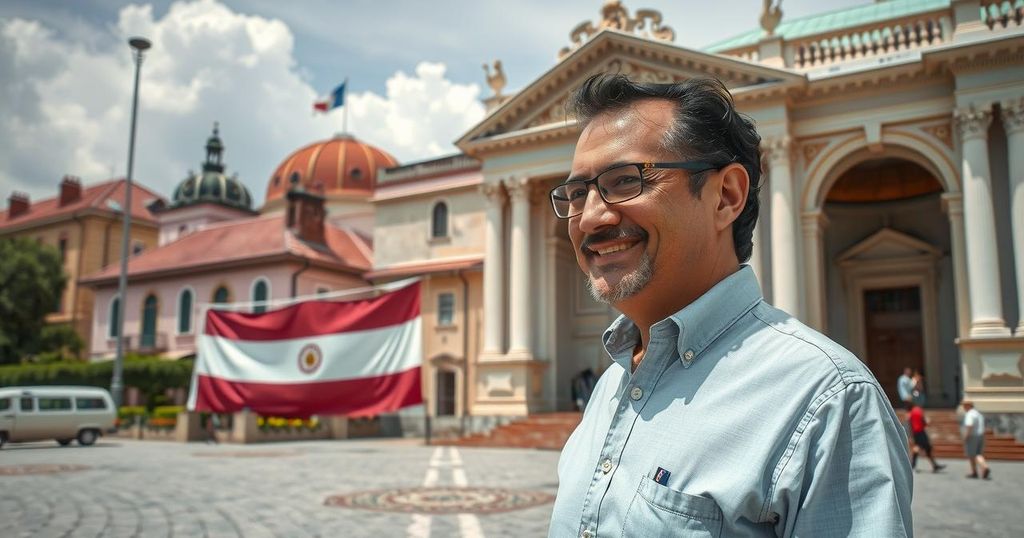Venezuelan opposition leader Edmundo González is touring Argentina and Uruguay to secure international support ahead of his planned presidency starting January 10. His visit includes meetings with key political figures amid threats from Nicolás Maduro’s regime. The landscape is complicated by Brazil’s cautious position and rising internal demonstrations aimed at supporting González against the backdrop of ongoing human rights concerns.
Edmundo González Urrutia, the Venezuelan opposition leader, is undertaking a significant regional tour that includes stops in Argentina and Uruguay. His primary objective is to garner international support in anticipation of assuming the Venezuelan presidency on January 10, following his declaration as the victor of last July’s elections. In Uruguay, González will engage with President Luis Lacalle Pou and Foreign Minister Omar Paganini, who have expressed their endorsement of his electoral success. Despite this support, González faces perilous circumstances as Nicolás Maduro’s regime allegedly seeks to undermine his legitimacy, reportedly placing a bounty of US$100,000 on his head. Amidst the tense political climate, it is crucial for González to solidify his international backing before the pivotal January date, especially given the caution exercised by the international community in light of previous scenarios like that of Juan Guaidó in 2019.
González’s tour will initiate in Argentina with a meeting with President Javier Milei and will subsequently proceed to Panama, the United States, and the Dominican Republic. Brazil, under President Luiz Inácio Lula da Silva, has adopted a nuanced stance, neither recognizing Maduro’s claim to victory nor dismissing diplomatic engagements entirely. Lula’s administration aims to maintain open communication channels with Caracas, emphasizing the importance of dialogue in resolving the crisis.
In Venezuela, preparations are underway for demonstrations in favor of González on January 10, driven by opposition leader María Corina Machado. Machado, who endorsed González’s candidacy due to her own political disqualification, has urged citizens to engage in acts of resistance, asserting, “The final defeat of the regime is very close.” Concurrently, human rights organizations are amplifying concerns regarding political prisoners, some of whom are participating in hunger strikes to advocate for their freedom. Amid this unrest, the Venezuelan government announced the release of over 1,400 prisoners in efforts to strengthen its position ahead of international diplomatic interactions.
The critical deadline for international recognition of Venezuela’s forthcoming president is set for January 10, marking the end of Nicolás Maduro’s constitutional term that began in 2018. The responses from the international community and the developments in Caracas will significantly influence the region’s political landscape moving forward.
The political landscape in Venezuela is characterized by deep divisions between the ruling Chavista government, led by Nicolás Maduro, and the opposition, represented by leaders like Edmundo González. The situation escalated following the disputed elections in July, where González claims victory based on opposition-collected voting tallies. International recognition of leadership in Venezuela has been fraught with caution following the previous experience with Juan Guaidó, highlighting the complexities of diplomatic relations in this context. As the January 10 deadline approaches for new presidential recognition, both internal resistance and external diplomatic strategies play pivotal roles in shaping Venezuela’s future and its relationships with neighboring countries.
Edmundo González Urrutia’s ongoing tour of Argentina and Uruguay is crucial in his pursuit of international support as he aims to assume the Venezuelan presidency. With the January 10 deadline looming, the political tensions surrounding his claims to power and Maduro’s continued reign are intensifying regional responses. Internal demonstrations and external diplomatic strategies are vital elements influencing the outcome of this political stalemate, with the international community remaining watchful and cautious following past experiences. The coming weeks will undoubtedly determine the trajectory of Venezuelan leadership and its implications for the region.
Original Source: en.mercopress.com






